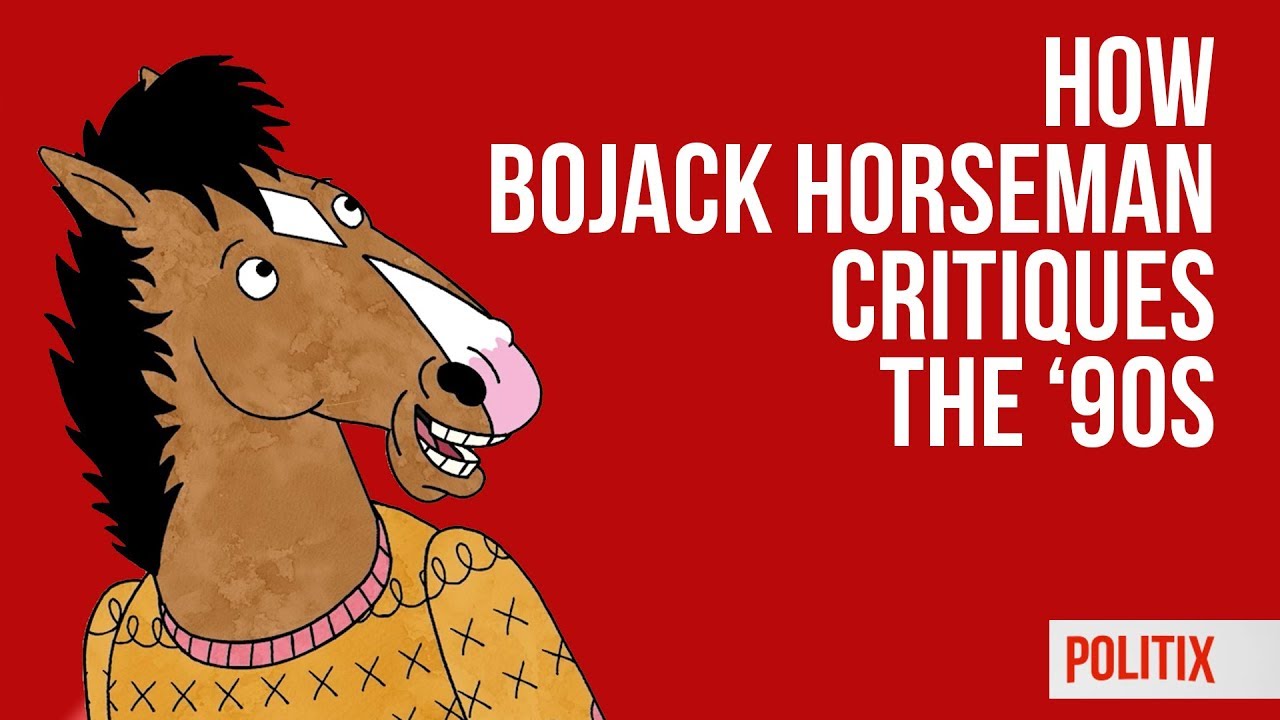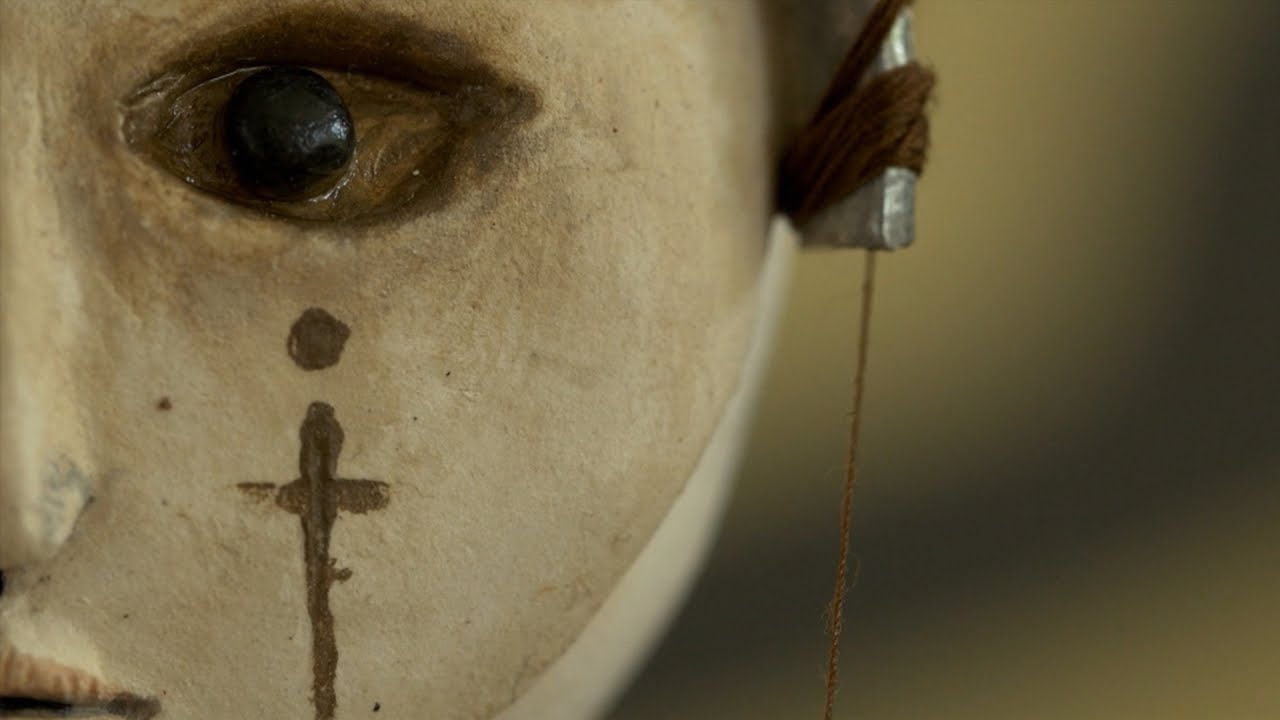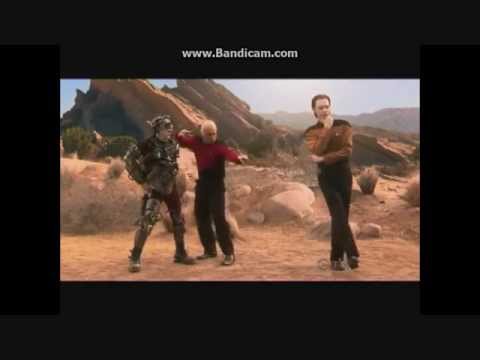With BoJack Horseman Season Five being released on Netflix a week and a bit ago, I thought I’d add to the avalanche of BoJack Horseman analysis videos already on YouTube by tackling how the series critiques our relationship with the recent past.
In particular, the role of Horsin’ Around (the “very famous TV show” in which BoJack once starred) in informing the protagonist of the show’s identity has always fascinated me. And so I thought I’d explore how BoJack Horseman subverts and critiques our memory of what culture really was like “back in the 90’s”.
I’m particularly interested in the narrative of Bojack, Mr. Peanutbutter and Sarah Lynn’s own trajectory between the 90’s and today as well as the career struggles of Todd and Diane in the present. Mostly, however, I’m interested in what all of these, taken together, might tell us about 90’s culture and that of today.
As is perhaps clear in the video, I was particularly inspired by Lindsay Ellis’ video on Stranger Things, It and the Upside Down of Nostalgia from December of last year. However, here, I primarily draw on the work of Frederic Jameson on parody and pastiche.
So, I hope this video essay adds something new to the videos already existing which interogate the philosophy of BoJack Horseman and other angles of analysis while also adding to my own Politix series.
Further Reading
BoJack Horseman: The Art Before the Horse by Chris McDonnell and Lisa Hanawalt
US: https://amzn.to/2SFooGI
UK: https://amzn.to/2T9Zofu
Someone Who Will Love You in All Your Damaged Glory: Stories by Raphael Bob-Waksberg
US: https://amzn.to/2tMs2Eq
UK: https://amzn.to/2EFiGk9
[The above are affiliate links. I receive a small kickback from anything you buy which, in turn, helps to support the channel.]
References
Chater, A. (2015) ‘From Real Housewives to The Brady Bunch: Bojack Horseman Finds Its Place’. /Kino: The Western Undergraduate Journal of Film Studies/. 6(1). Available at: https://ir.lib.uwo.ca/kino/vol6/iss1/3
Ellis, L. (2017) ‘Stranger Things, IT and the Upside Down of Nostalgia’. /YouTube/. [Online] https://www.youtube.com/watch?v=Radg-Kn0jLs [Accessed: 19 September 2018].
Jameson, F. (1991) /Postmodernism, or, the Cultural Logic of Late Capitalism/. Durham: Duke University Press. p. 17.
Pappenheim, J. (2018) ‘Why “13 Reasons Why” fails at portraying mental health where “BoJack Horseman” succeeds’. /Shortlist/. [Online] https://www.shortlist.com/news/opinion/13-reasons-controversial-suicide-mental-health-depression-anxiety-bojack-horseman-netflix/358519 [Accessed: 19 September 2018].
Weinstock, J. A. (2008) ‘Simpsons Did It!’. in /Taking South Park Seriously/. Albany: State University of New York Press. p. 88.
If you’ve enjoyed this video and would like to see more including my What The Theory? series in which I provide some snappy introductions to key theories in the humanities as well as PhD vlogs in which I talk about some of the challenges of being a PhD student then do consider subscribing.
Thanks for watching!
Twitter: @Tom_Nicholas
Website: www.tomnicholas.com
Tom Nicholas
Source




If you like horse puns, go watch My Little Pony. that show has tons of em.
Excellent video with a very thorough break down. Great job!
could be a bit shorter; otherwise a great effort and point to make.
I felt like this was light on substance considering its length; too rambly and unfocused for my liking. m2c
You never thought about how stranger things don’t use casual racism and sexism
Take a shot every time this guy says “pastiche”
This is brilliant. What did you study to know so much about all this?
Truly fantastic video.
Right! Nobody talks about that ending song. It almost seems to be the theme song
This seems like a good video but the audio is a little low I'm also catching some echo in the recording. Thank you for your points otherwise
Very interesting observations, good job!
Damn, son. Did not expect such quality, in-depth analysis from this video. I was just gonna make some falafel with you on the background, but you grabbed my attention. Congrats! Liked and subscribed!
I think the flashbacks are a criticism of not just nostalgia for the 90s, but a critique of nostalgia as a whole. Nostalgia for the 40s and onwards is subverted with the way the show presents the awful things that have happened during that point in time.
This is my first video of Tom’s, and I gotta be honest. You know how Kelsey’s in love with Todd’s face almost immediately? That was me with Tom.
You deserve more subscribers! Great stuff!
this is the type of guy bojack would make fun of haha
i love this! you are adorable, great video man
Our memories are not perfect so we forget many details of it. It also is easy to see life in emotional monotone binary of good and bad instead of a mixture of both. We remember what emotionally affect us the most. Things have to be really messed up for you in the past for you to remember only the bad. But if the society was messed up in ways that did not affect you personally but other people around you that you did not notice as being messed up then you remember only the good of a bad situation. It is the same thing for future centric people in reverse the past was bad so anything different from it must be good without flaw completely ignoring the bad in the present if it does not affect you personally with the hope off a perfect future while not seeing the merit in the past of how it created the present.
Why are Brits so obsessed with BoJack? I've seen numerous videos of Brits taking deep dives into some aspect or another with regards to BoJack Horseman.
4:46 Wait, that was you ?!
Too much talking in an uninterested manner
Thoughtful and concise look at this loaded topic! Thanks for the great video!
I used to love South Park when I was young but my tastes have matured and I discovered that many of the points the creators were trying to make were proven wrong and that they were overtly obvious with their metaphors. This is a vast difference than the genius that is BoJack Horseman which uses complex character development, subtext, and interweaving plot lines tied into a greater narrative. This reminds me of the South Park episode the ridiculed Family Guy because they designed a character who has the same personality type as Peter Griffin but only argued that their show is better written. Well, BoJack is far superior and didn't have to rip off Family Guy to do it.
Don’t put trash like South Park in the same category it’s just hate spewed every way in no real story line.
BoJack has actual intelligent references and such in it.
Strangers Things is definitely Pastiche. Bojack however is 100% satire on the level of a Norman Lear series. The 90's in this show are represented through a nostalgic satyrical view. As apposed to Stranger Things which goes out of its way to emulate that of 80's movies copying character-types to a T, having ideas on who they represent but being completely original. Bojack is completely original, but it satires what has been going on in Hollywoo(d) throughout the last year in the real world.
It's always hard to find videos that engage with media on more than a surface level "that's good, this is bad" way. Great analysis, Great vid!
I personally don’t really like jokes like 17:55. It kind of weird to do reactions to your own script. But I really liked the video 🙂
Take it to the point man… Desnecessarily long…
Good on you best show on TV
Now get your head round the old and new twin peaks and how David Lynch destroys the idea of nostalgia completely
It's not comedy it's drama with little comedic elements
All I can hear is that kid who played Harry Potter… Elijah Wood.
Bojack Horseman is a show that is very honest and blunt in it's critique of nostalgia as an idea. Bojack Horseman is a person who has never truly been consistently happy in life. As with most events in his life, he desperately hoped that Horsin' Around would make him happy, but of course, as soon as it ends, so does his happiness. I mean, he was never really happy on the show either, as shown by the flashbacks where he displays this constant, biting jadedness and cynicism, particularly in his monologues to Sarah Lynn under the table and at the hairdressers. But after the show ended, he coasted along on his fame, and as soon as his celebrity faded from the immediate public, he began to idolize the period in his life where he thought he was "happiest", the 90s during Horsin' Around. Wherever there is a flashback to the 90s, we immediately see this contrasted with the reality that Bojack wasn't even really happy during Horsin' Around. The show also points out very bluntly the problems with the eras it flashes back to other than the 90s, with "The Old Sugarman Place" episode showcasing the problems with the 40s (Beatrice loses her older brother during WW2. This devastating loss leaves Beatrice's mother emotionally unstable, and her husband is left to point out that "as a man during the 1940s, I am brutally unequipped to handle any sort of display of womanly emotions".).
13:06 I feel this is also done to show that happiness is more than what it appears on the surface. Bojack Horseman has literally become one in a million. He's been a successful stand-up comic and actor, starred in an 11 season long hit sitcom, made it rich, bought a huge house in Beverly Hills, and yet, he's pretty much the farthest from true happiness he's ever been.
This is really well done! Good job and keep up the cool videos!
I don’t want to ignore the content of video, it’s great and I love the analysis, it looks like you’ve done your research but…
You look like Niall Horan, just wanted to say that lol
I know this is so random, but just by looking at your face I feel like having you as a good friend hahah.
Rising inequality? LOL
Did you steal part of James Corden's soul?
Hi Tom, thank you for the video, it was extremely interesting and I am looking forward to seeing more!
I want to add a criticism here: a little too slow and a bit boring at times. If you could make it more dynamic (without stupid youtube cutoffs that we are used to seeing everywhere) and a bit shorter would be nice.
Hi all, thanks for watching! If you've enjoyed this, then I've just uploaded a new episode of Politix in which I take a look at The Good Place which you can check out here: https://www.youtube.com/watch?v=mwisP7HE_sM
It's kind of weird to suggest that Hank Hipoppopolis relates to the #MeToo movement when the episode predates it by two years…
I just stumbled across this channel by chance. I´m amazed. I love the fact that you provide links for further reading & sources. Congrats from Argentina.
The video takes 7min to start to develop its point. Sorry, I couldn't make it to the end because of all the prolix discuss. I'm pretty sure that all the points could be covered in less than 15min, not the actual 23min
uh, what? the 90s was more counterculture to the moralistic attitude of the 80s than anything else.